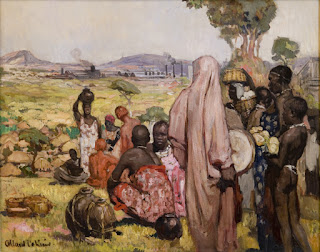
After a long pause in this blog I am returning fresh with inspiration fuelled by new music explorations which has the Cora firmly placed in the centre of the stage. A new album by a previously unheard of artist in Europe,
Amadou Sodia, 'Ca Va Se Savoir' , graces the ears with a Salif Keita style of sound - strong male vocals backed by female singers which provide a rhythmic echo, in the first track adiananco, moving the sound into a rolling swell. It's a great quality recording, capturing all the sounds of the instruments without cluttering the overall sound. Here a sample
here.

Due to the unique way in which the Cora can have multiple melodies operating at any one time, and due the fact that it is a great instrument for creating layers of sound and because music in Europe has taken from the quantizing of sound to a 4/4 beat across all the music genres, the Cora has great potential for bringing traditional African music to a wider audience. African artists such as
Ba Cissoko have already ventured into this territory with modest results. One of the first artists to do this back in 2002 was
Issa Bagayogo, and his latest album is a true crossover into dance music and what is becoming the genre of cora house music! Its framing is still in Malian music but has more of a club house production which results in a sound that will cross over very well into dance and popular British music if marketed right. Again a superb quality recording that really brings out the different instruments articulating the landscape within. 'Tcheni Tchemakan' is featured
here and is one of the best of the album called 'Mali Koura'.

A new album has also been released by
Roika Traore, 'Tchamantche', which is a break from her first album, and has a more of a varied range of songs from blues to soul, and traditional malian pieces. There is no mistaking the sublime voice this artist has and I am reminded of the voice of Deborah Dyer (of Skunk Anasie) as she has the same ability to add a cold and chilling edge to her performance.. I have no doubt that this is one recording that needs to be enjoyed on a first rate audio system to appreciate the depth and emotion contained within each of the tracks.. You can sample 'Kounandi'
here.

Last…it's back to pure Cora, however this time with a cultural twist. It comprises a talented trio of musicians from Madagascar, Mali and Morocco.
Rajery,
Ballake Sissoko and
Driss El Maloumi respectively provide an intercultural exchange of sounds from these three countries. For those already familiar with artists such as
Toumani Diabate, the late
Ali Farka Toure,
Ba Cissoko and other Cora kings, this album is a worthwhile addition to the collection. Here is a sample from the album '3Ma', the track 'Awal'
here.
I’ll be back sooner next time, keep listening to World.







 The London African Music Festival
The London African Music Festival
